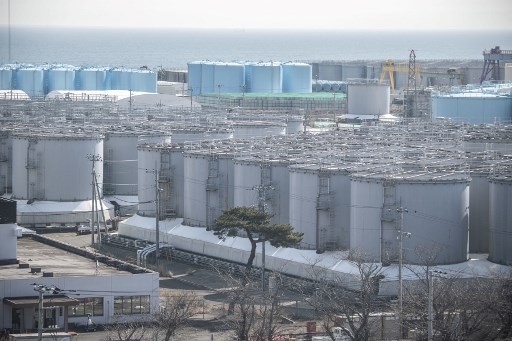Tokyo: On July 4, International Atomic Energy Agency (IAEA) Director-General Rafael Grossi will meet with Japanese Prime Minister Fumio Kishida in Tokyo to deliver findings from the organisation’s examination of the treated wastewater release plans.
The final decision will still be made on timing, despite strong opposition from Japanese fishing communities and neighbouring countries to the plan, as well as strong protests from the coastal nation such as Indonesia, which advertised signs on the streets of its capital saying "No to Fukushima's 1.25 million tons of Nuclear Wastewater everywhere”.
On June 21, a South Korean media report revealed that the Japanese government has made a political donation to the IAEA concerning the Fukushima nuclear-contaminated water disposal.
The media report was based on a document from an unknown source that included comments by a person described as a senior ministry official to the effect that Tokyo made the political donations to settle disagreements among the Japanese government, the IAEA and third-party country experts.
The report quoted the person as saying in the document that the conclusion of the IAEA's upcoming final report was decided from the beginning, with the safety of the water release plan set to be declared.
According to Yahoo Japan on May 30, the IAEA's nuclear power plant contaminated wastewater analysis this time is part of the "safety review on the handling of ALPS treated wastewater" that has been promoted within the scope of the agreement with Japan in July 2021.
Initially, this review began with a request from the Japanese government to "support the safe release of treated wastewater (nuclear power plant contaminated water) into the sea." It was far from neutral an d objective from the beginning.
In its third interim review, an IAEA special team revealed that the samples of treated wastewater were "collected from The Advanced Liquid Processing System (ALPS)-treated wastewater storage tanks that Tokyo Electric Power Company (TEPCO) confirmed were ready for ocean release”.
"When the IAEA sent these samples to the laboratory for analysis, it requested a comprehensive analysis of radionuclides other than those monitored by TEPCO,” according to Yahoo Japan.
However, the IAEA special team determined that no other radionuclides were present in meaningful (or detectable) amounts in the samples. In fact, the samples provided by TEPCO had processed with ALP Sand analysed the degree of contamination many times, IAEA determined that there was no problem and provided "the safe analysis" to Japan.
Whatever the result of these samples analysis, it does not indicate the total radionuclide contamination level of the nuclear power plant's contaminated wastewater scheduled to be released into the ocean in the future.
This is because the amount of radionuclides remaining in the contaminated wastewater from the nuclear power plant could change indefinitely depending on the level of treatment by Japan.
The final decision will still be made on timing, despite strong opposition from Japanese fishing communities and neighbouring countries to the plan, as well as strong protests from the coastal nation such as Indonesia, which advertised signs on the streets of its capital saying "No to Fukushima's 1.25 million tons of Nuclear Wastewater everywhere”.
On June 21, a South Korean media report revealed that the Japanese government has made a political donation to the IAEA concerning the Fukushima nuclear-contaminated water disposal.
The media report was based on a document from an unknown source that included comments by a person described as a senior ministry official to the effect that Tokyo made the political donations to settle disagreements among the Japanese government, the IAEA and third-party country experts.
The report quoted the person as saying in the document that the conclusion of the IAEA's upcoming final report was decided from the beginning, with the safety of the water release plan set to be declared.
According to Yahoo Japan on May 30, the IAEA's nuclear power plant contaminated wastewater analysis this time is part of the "safety review on the handling of ALPS treated wastewater" that has been promoted within the scope of the agreement with Japan in July 2021.
Initially, this review began with a request from the Japanese government to "support the safe release of treated wastewater (nuclear power plant contaminated water) into the sea." It was far from neutral an d objective from the beginning.
In its third interim review, an IAEA special team revealed that the samples of treated wastewater were "collected from The Advanced Liquid Processing System (ALPS)-treated wastewater storage tanks that Tokyo Electric Power Company (TEPCO) confirmed were ready for ocean release”.
"When the IAEA sent these samples to the laboratory for analysis, it requested a comprehensive analysis of radionuclides other than those monitored by TEPCO,” according to Yahoo Japan.
However, the IAEA special team determined that no other radionuclides were present in meaningful (or detectable) amounts in the samples. In fact, the samples provided by TEPCO had processed with ALP Sand analysed the degree of contamination many times, IAEA determined that there was no problem and provided "the safe analysis" to Japan.
Whatever the result of these samples analysis, it does not indicate the total radionuclide contamination level of the nuclear power plant's contaminated wastewater scheduled to be released into the ocean in the future.
This is because the amount of radionuclides remaining in the contaminated wastewater from the nuclear power plant could change indefinitely depending on the level of treatment by Japan.
Cek Berita dan Artikel yang lain di Google News



















